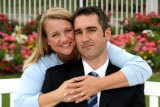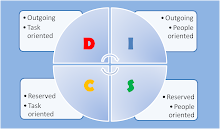I was telling a friend about one of the many beneficial aspects of DISC and it kinda related to New Year's resolutions, so I thought I'd share... one thing I really like about DISC is that I could write down for you a list of my strengths and weaknesses in 30 seconds or less. I know exactly what I'm good at, what comes naturally to me, and what I stink at. If there is a particular thing I want to accomplish, I know what the challenges will be for me, specifically, and what I'll have to do to overcome and accomplish. There are strengths of all the different personality types that I want to develop. There are weaknesses I want to overcome. I can name them. No guilt. Not beating myself up. I just have to work harder at certain things.
So, as the new year begins, I'll pick one or two, or twelve, and work on them. Something new this year, I think. I'm tired of trying to keep my junk drawer organized.
Wednesday, December 31, 2008
Tuesday, November 25, 2008
Our oldest daughter and her husband are expecting their first child. In fact, he's overdue. So she calls the other day and says, "Well, I tried to tell the baby how fun we are, thinking that if he was an "I," he'd want to come out. Didn't work. So then I tried giving him a list of pro's and con's so he could evaluate whether or not it was a good idea to come out. Didn't work... not a "C." So I'll talk really sweetly to him today and see if that works." So far, no baby. She may have to raise her "D."
I had to laugh, but it thrilled me just to see her applying her knowledge of DISC in an everyday situation. Imagine the difference it could make in a person's life if they were taught at a young age the principles of personality differentiation and how to communicate effectively with any temperament... interaction with friends, teachers, family. The first thing I noticed personally was a new tolerance- -tolerance for differences. But then it grew beyond tolerance to an appreciation. I need other peoples' strengths. They need mine. How critical it is to get this information into the hands of parents and educators.
One final triumphant note... my twelve year old son came home from school a couple of weeks ago and told me he'd made a new friend. I asked him what his new friend was like and he said, "Oh, you'd love him, Mom. He's off the charts 'I'!" It's working!
I had to laugh, but it thrilled me just to see her applying her knowledge of DISC in an everyday situation. Imagine the difference it could make in a person's life if they were taught at a young age the principles of personality differentiation and how to communicate effectively with any temperament... interaction with friends, teachers, family. The first thing I noticed personally was a new tolerance- -tolerance for differences. But then it grew beyond tolerance to an appreciation. I need other peoples' strengths. They need mine. How critical it is to get this information into the hands of parents and educators.
One final triumphant note... my twelve year old son came home from school a couple of weeks ago and told me he'd made a new friend. I asked him what his new friend was like and he said, "Oh, you'd love him, Mom. He's off the charts 'I'!" It's working!
Monday, November 24, 2008
DISC vs. Meyers Briggs
Okay, this one's not so much about kids... I was doing a little research this week into other personality style tests just to see how some of them compare to DISC. The most common test used is the Meyers Briggs "personality style indicator." I found quite a bit written on Meyers Briggs and read for hours. But the more I read, the less I knew. It was unbelievably non-user friendly. I'm sure it's easy enough if you've, say, done your graduate studies in it. But for the average person to understand it, much less use it, is highly unlikely. I did a self assessment which was a little confusing; the questions were pretty abstract. My style ended up being "ASDFJKL;" or some crazy thing like that (okay, I might have made that up, but it was close). And whatever your style is, it supposedly never changes over your entire life, which is unrealistic. At any rate, it was too complicated to put into any practical application. And therein lies the beauty of DISC. Anyone can learn the basic principles and begin applying them easily. If you know enough about a person to know if they're outgoing or reserved,and if they're people or task oriented, you're good. You can then take what you've learned and adjust your interaction with that person so that you "speak their language." It's all about communication. If we understand each other, we're going to be able to work together much more effectively. Common sense, right? But you know what they say about common sense... it's anything but common.
Saturday, November 15, 2008
First, let me make one thing clear. I am a mother. I do not take it lightly. I was born for this, and what's more, I'm good at it. For these few years (okay, sometimes it seems like slightly more than a few), but for these few years that my children are growing and reliant on me to raise and guide them, I treat this like a full-time job. I'm not talking one of those 9 to 5 kind of jobs...when I say full-time, I mean full-time. 24/7. I can say this with all sincerity, because my 4 year old frequently sneaks into our room at night and curls up next to me. So even when I'm asleep, I'm on duty. My goal is to turn out five of the most loving, upright, happy, honest, hard working adults the world has ever seen. I'm not kidding.
Okay, having said all that...in my search to better myself as a parent and learn as much as I can that will benefit my children, I read. I look for anything that might educate me and help me to help them. I've found lots of great stuff over the years, but none has been so important, so revolutionary for me personally as DISC. I remember sitting at a seminar ten years ago learning about DISC for the first time. Our daughter, Claire, was 4 at the time. For months I had been troubled by my relationship with my beautiful, smart, perfect little girl. I'm a pretty high "I" and no matter how I tried, I just couldn't seem to connect with this serious, articulate little person. I tried so hard to make her laugh and be silly and act like a carefree child, but to no avail. My son, David was 2 at the time and full of life, usually bouncing off the walls. He reacted to me in a way that I understood, jumping on the bed right along with me. I'll never forget one beautiful, sunny afternoon I decided to take the children out for ice cream. We'd been in the house all day and I thought it would be fun to get out for a few minutes. So I say to 4 year old Claire and 2 year old David, "Who wants to go out for ice cream?!" David immediately starts jumping up and down and singing, "I do! I do!" (appropriate reaction, right?). I turn to look at my little Claire, and there she stood, all serious and pensive...almost looking a little worried. Then she said, "Mommy... I want my ice cream in a cup this time instead of a cone. The last time, the cone made too big of a mess. And don't forget the napkins this time. Last time you forgot them." (?!?!?!) All I could think was, "Something's wrong with her!" So there I sit, several months later, in a DISC seminar for the first time. As the speaker was explaining the basics of the DISC model, it was as if the heavens opened up and choirs of angel began to sing (I told you, I'm an "I"). It clicked. I finally got it. I understood at last. My little girl was a "C." I immediately began to read and learn all I could about DISC. I first had to learn the information and understand it, and then I had to learn to apply it. As cheesy and cliche as this sounds, I can honestly say, it has made all the difference in my life and relationships. I believe that if everyone was equipped with this knowledge and then used it, the world would be a mighty different place.
Okay, having said all that...in my search to better myself as a parent and learn as much as I can that will benefit my children, I read. I look for anything that might educate me and help me to help them. I've found lots of great stuff over the years, but none has been so important, so revolutionary for me personally as DISC. I remember sitting at a seminar ten years ago learning about DISC for the first time. Our daughter, Claire, was 4 at the time. For months I had been troubled by my relationship with my beautiful, smart, perfect little girl. I'm a pretty high "I" and no matter how I tried, I just couldn't seem to connect with this serious, articulate little person. I tried so hard to make her laugh and be silly and act like a carefree child, but to no avail. My son, David was 2 at the time and full of life, usually bouncing off the walls. He reacted to me in a way that I understood, jumping on the bed right along with me. I'll never forget one beautiful, sunny afternoon I decided to take the children out for ice cream. We'd been in the house all day and I thought it would be fun to get out for a few minutes. So I say to 4 year old Claire and 2 year old David, "Who wants to go out for ice cream?!" David immediately starts jumping up and down and singing, "I do! I do!" (appropriate reaction, right?). I turn to look at my little Claire, and there she stood, all serious and pensive...almost looking a little worried. Then she said, "Mommy... I want my ice cream in a cup this time instead of a cone. The last time, the cone made too big of a mess. And don't forget the napkins this time. Last time you forgot them." (?!?!?!) All I could think was, "Something's wrong with her!" So there I sit, several months later, in a DISC seminar for the first time. As the speaker was explaining the basics of the DISC model, it was as if the heavens opened up and choirs of angel began to sing (I told you, I'm an "I"). It clicked. I finally got it. I understood at last. My little girl was a "C." I immediately began to read and learn all I could about DISC. I first had to learn the information and understand it, and then I had to learn to apply it. As cheesy and cliche as this sounds, I can honestly say, it has made all the difference in my life and relationships. I believe that if everyone was equipped with this knowledge and then used it, the world would be a mighty different place.
Labels:
children,
disc,
kids,
motherhood,
personality
Subscribe to:
Comments (Atom)




